最新人教版八年级英语下册知识点归纳
- 格式:docx
- 大小:23.76 KB
- 文档页数:8
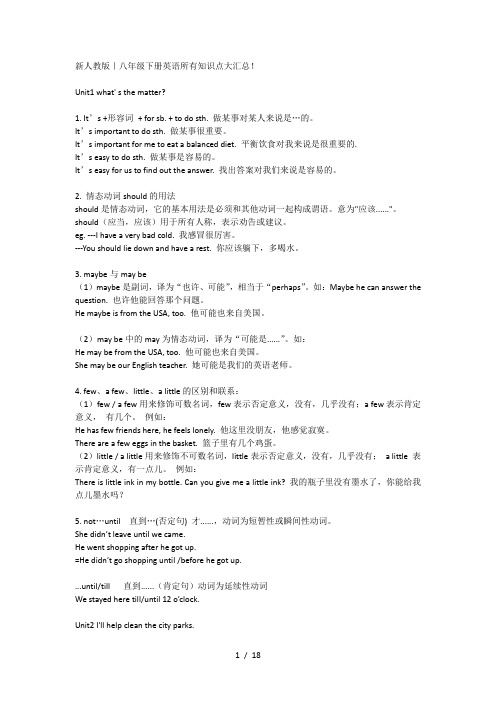
新人教版|八年级下册英语所有知识点大汇总!Unit1 what' s the matter?1. It’s +形容词+ for sb. + to do sth. 做某事对某人来说是…的。
It’s important to do sth. 做某事很重要。
It’s important for me to eat a balanced diet. 平衡饮食对我来说是很重要的.It’s easy to do sth. 做某事是容易的。
It’s easy for us to find out the answer. 找出答案对我们来说是容易的。
2. 情态动词should的用法should是情态动词,它的基本用法是必须和其他动词一起构成谓语。
意为"应该......"。
should(应当,应该)用于所有人称,表示劝告或建议。
eg. ---I have a very bad cold. 我感冒很厉害。
---You should lie down and have a rest. 你应该躺下,多喝水。
3. maybe与may be(1)maybe是副词,译为“也许、可能”,相当于“perhaps”。
如:Maybe he can answer the question. 也许他能回答那个问题。
He maybe is from the USA, too. 他可能也来自美国。
(2)may be中的may为情态动词,译为“可能是......”。
如:He may be from the USA, too. 他可能也来自美国。
She may be our English teacher. 她可能是我们的英语老师。
4. few、a few、little、a little的区别和联系:(1)few / a few用来修饰可数名词,few表示否定意义,没有,几乎没有;a few表示肯定意义,有几个。
例如:He has few friends here, he feels lonely. 他这里没朋友,他感觉寂寞。

八年级下册人教版英语笔记一、Unit 1 What's the matter?1. 重点单词。
- matter:n. 问题;事情。
常用搭配:What's the matter (with sb.)? = What's wrong (with sb.)? = What's the trouble (with sb.)?(某人)怎么了?- sore:adj. 疼痛的;酸痛的。
例如:a sore throat喉咙痛。
- stomachache:n. 胃痛;腹痛。
- foot:n. 脚;足。
复数形式是feet。
- neck:n. 脖子;颈部。
- fever:n. 发烧。
have a fever发烧。
- lie:v. (lay - lain)躺;平躺。
lie down躺下。
- rest:v. & n. 放松;休息。
take breaks/take a break = have a rest休息。
- cough:v. & n. 咳嗽。
have a cough咳嗽。
- toothache:n. 牙痛。
2. 重点短语。
- have a cold:感冒。
- have a stomachache:胃痛。
- lie down and rest:躺下休息。
- drink some hot tea with honey:喝些加蜂蜜的热茶。
- see a dentist:看牙医。
- get an X - ray:拍X光片。
- take one's temperature:量体温。
3. 重点句型。
- What should I do? 我应该做什么?- You should see a dentist and get an X - ray. 你应该去看牙医并拍X光片。
- Should I put some medicine on it? 我应该在上面敷些药吗?- Yes, you should. / No, you shouldn't. 是的,你应该。

最新人教版八年级英语下册第一单元知识点汇总Unit 1 What’s the matter?一、基础知识1.我感冒了。
可以表达为I had a cold、catch a cold或have the flu。
have a fever表示发烧,have a cough表示咳嗽,have a stomachache或肚子疼表示胃疼,have a toothache表示牙疼,have a headache表示头疼。
2.将身体部位和ache(疼痛)结合起来构成新的复合词,如stomach+ache=stomachache,head+ache=headache,tooth+ache=toothache,back+ache=backache,表示相应的疼痛。
3.“怎么啦?出什么事情了?”可以表达为What’ s the matter。
也可以用What’ s the trouble with you?或What’ s wrong with you。
matter和trouble为名词,其前可加the或形容词性物主代词,而wrong是形容词不能加the。
用于询问某人有什么病或遇到什么麻烦、问题,其后跟询问对象时,与介词with连用,如What’s the matter with sb。
= What’s your trouble?= What’s up?= What happens to sb。
举例来说,当问到“What’s the matter with you?”时,回答可以是“I have a bad cold.”4.maybe表示“或许”,常用于句首,表示可能性,后加句子。
例如Maybe you are right。
may be是情态动词+be的结构,意为“可能,也许”,后加名词、代词或形容词。
例如He maybe angry。
sound like可以和名词、代词以及从句结合使用,如It sounds like you don’t know the truth.It sounds like a good idea。
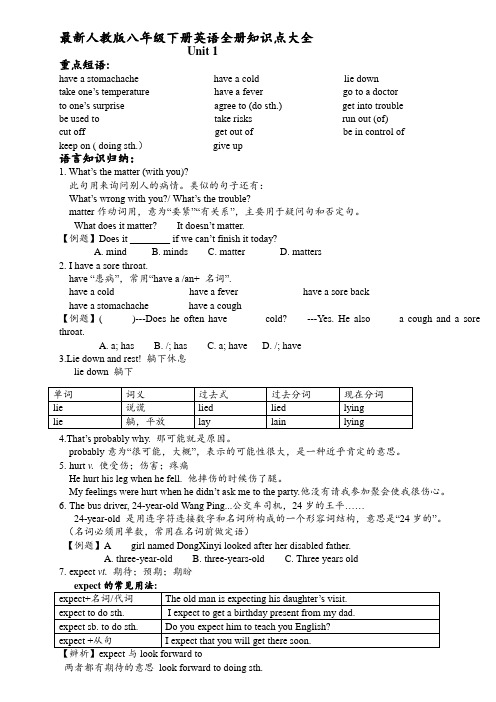
最新人教版八年级下册英语全册知识点大全Unit 1重点短语:have a stomachache have a cold lie downtake one’s temperature have a fever go to a doctorto one’s surprise agree to (do sth.)get into troublebe used to take risks run out (of)cut off get out of be in control ofkeep on ( doing sth.)give up语言知识归纳:1. What’s the matter (w ith you)?此句用来询问别人的病情。
类似的句子还有:What’s wrong with you?/ What’s the trouble?matter作动词用,意为“要紧”“有关系”,主要用于疑问句和否定句。
What does it matter? It doesn’t matter.【例题】Does it ________ if we can’t finish it today?A. mindB. mindsC. matterD. matters2. I have a sore throat.have “患病”,常用“have a /an+ 名词”.have a cold have a fever have a sore backhave a stomachache have a cough【例题】( )---Does he often have ______ cold? ---Yes. He also _____a cough and a sore throat.A. a; hasB. /; hasC. a; haveD. /; have3.Lie down and rest! 躺下休息lie down 躺下4.That’s probably why. 那可能就是原因。
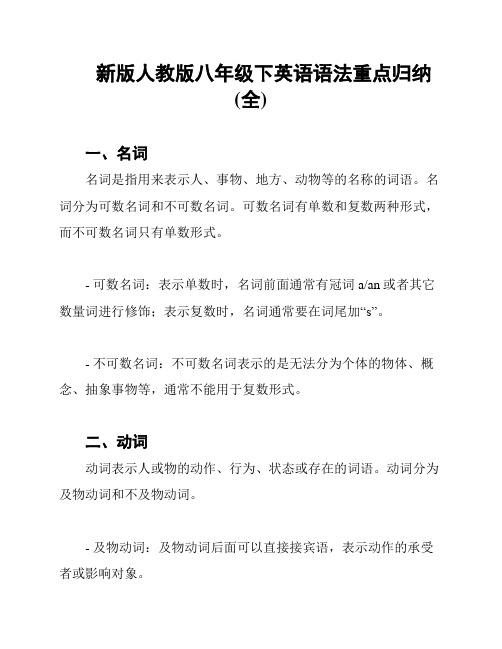
新版人教版八年级下英语语法重点归纳(全)一、名词名词是指用来表示人、事物、地方、动物等的名称的词语。
名词分为可数名词和不可数名词。
可数名词有单数和复数两种形式,而不可数名词只有单数形式。
- 可数名词:表示单数时,名词前面通常有冠词a/an或者其它数量词进行修饰;表示复数时,名词通常要在词尾加“s”。
- 不可数名词:不可数名词表示的是无法分为个体的物体、概念、抽象事物等,通常不能用于复数形式。
二、动词动词表示人或物的动作、行为、状态或存在的词语。
动词分为及物动词和不及物动词。
- 及物动词:及物动词后面可以直接接宾语,表示动作的承受者或影响对象。
- 不及物动词:不及物动词不能直接接宾语,它可以后面接副词或介词短语,表示动作发生的方式、状态等。
三、形容词形容词是用来描述名词性词语的词语。
它可以表示人或物的性质、状态、特征、颜色等。
- 形容词可以修饰名词,放在名词的前面。
- 形容词还可以通过加后缀“-er”和“-est”来比较级和最高级。
四、副词副词是用来修饰动词、形容词和其他副词的词语。
副词可以表示时间、地点、方式、程度、频率等。
- 副词在句中通常位于动词、形容词或者其他副词的前面。
- 副词的比较级和最高级可以通过在前面加上more和most来表示。
五、代词代词是用来代替名词或名词性的词语的词语。
代词可以分为人称代词、指示代词、疑问代词、不定代词等。
- 人称代词表示人的身份或人称,包括主格和宾格两种形式。
- 指示代词用来指示特定的人或物,可以表示近处的、远处的或已提到的事物。
- 疑问代词用于提问,通常用来询问人或事物的身份、性质、数量等信息。
- 不定代词用来指代不特定或泛指的人或物,表示数量或程度。
六、冠词冠词是位于名词前面用来修饰名词的词语。
冠词分为定冠词和不定冠词。
- 定冠词指特指某一具体的人或事物,有两种形式:定冠词“The”用于表示特定的人或物,而不定冠词“A/An”用于泛指任意的人或物。
七、介词介词是用来表示人或物之间关系的词语。

人教版英语八年级下Unit 1 What’s the matter一、重点单词及用法1.foot-feet 单复数的考察常用复数同:tooth-teetheg:Look,my f_____ are very big,but the new shoes are so small.2.stomach 变复数词尾直接+s stomachseg:The children can’t eat too much ice-cream because it’s bad for their s_______.3.X-ray 冠词考察无特指情况下用an X-ray4.lie躺-lay(过去式)-lying(现在分词)躺lie down 躺下eg:They are _______(lie)on the beach and having a good time5.passenger 乘客复数passengerseg:There were ten __________ on the bus at that time.6.bandage n.绷带v.用绷带包扎eg:Can you put the bandage on the cut(改为同义句)Can you _________ yourself7.Kilo 复数kiloseg:How many ______ of tomatoes do you want8.knife 复数kniveseg:Don’t play with may cut your fingers.9.death n.死亡die v.死亡-died(过去式)-dying(现在分词)dead (形容词死亡的)eg:The dog’s ______ made him very sad.10.s ick 生病的既可以作表语又可以做定语be sick =be illeg:We are going to visit _______ children in hospital.二、重点短语have a cold =catch a cold =have the flu 感冒cough 咳嗽lie down 躺下take one’s temperature 量体温have a fever 发烧take/have breaks/a break 休息=take/have a rest get off 下车-get on上车to one’s surprise 令某人惊讶的是right away 立刻马上=right now get into (trouble)陷入(麻烦)get sunburned 被晒伤be used to (doing)习惯于适应于...... take risks/a risk 去冒险run out (of)用完用尽cut off 切除get out of 离开从......出来be in control of 掌管管理give up (doing)放弃(做)某事have a stomachache 胃痛get an X-ray 做一个X射线检查thanks to......由于多亏in time 及时on time 准时think about 考虑think of认为fall down 摔倒make a decision 作决定put......on......把....放在...上be interested in 对...感兴趣三、用法总结1.need to do sth需要做某事eg: The teacher needs_____(rest) for a few minutes.like 意为“听起来像”后接n./adj./句子eg: It sounds like a good idea.类似的感官动词+like:feel like/smell like/ look like/taste like/seem likesound+adj. 结构中,sound 是系动词意为“听起来是”后接形容词eg:That sounds great.+n./doing(v.现在分词)He went to school without having breakfast. eg:He left the classroom without ________ anythingv.同意,赞成agree with sb/某人的意见看法Does she agree with usagree to do sth 同意做某事They agreed to solve the problem. problems (in) doing sth做某事有困难=have trouble/difficulty (in) doinghave problems with sth =have trouble/difficulty with sth 在某方面有困难eg:One of my good friends said he had problems__________(learn) English.get used to doing sth 习惯于做某事eg:He used to get up late,but now he is used to getting up early.used to do sth 过去常常做某事(现在不做了)eg:He used to read English in the evening.use sth to do sth 使用用某物做某事eg:So he used knife to cut off his arm.be used to do sth 被动被用于做某事eg:These new pens are used to paint the wall.one’s life 丧失生命save one’s life 挽救某人的生命eg:He lost his life in the car accident.adj.足够的充足的后接名词n. enough moneyadv.足够地修饰形容词/副词enough要后置eg:The book is_______,but I don’t have enough money ______it.interesting; to buy enough; to buyenough; buying interesting; buying9. the importance of (doing)sth (做)某事的重要性important adj.重要的unimportant adj.不重要的importance n.重要性eg:We students should know the importance of (learning)English.n.决定make a decision (to do sth)decide to do sth 决定做某事decide not to do sth 决定不做某事eg:Tom made a decision to study English well.up 放弃give up 是动词+副词结构接代词作宾语时代词放中间eg:The problem is so difficult for you,but don’t _______A.give it up it out up it out itgive up doing sth 放弃做某事eg:You will be very sad if you give up______(sing).用法keep on doing sth 继续做某事(中间有间隔强调重复性)eg:He kept on studying though he was very tired.keep doing sth 继续不停地做某事(不间断连续性)eg:Keep walking until you reach the end of the road.keep sb doing 让某人一直做某事eg:Don’t keep the other students waiting.keep sb from doing sth 阻止某人做某事eg:We should keep the little boy from stepping on the grass.用法find找到,强调寻找的结果look for强调寻找过程find out找出查明eg:I was looking for my watch,but I didn’t find it.find sb doing sth 发现某人正在做某事eg:When I walked along the road,I found an old man shouting for help.find it +adj形容词+to do sth 发现做某事是...的eg:She found it hard to finish the work by herself.risks=take a risk 冒险He likes taking risks.risk one’s life to do 冒着生命危险去做某事eg:He risked his life to save the child.risk doing stheg: The man called Tom often risks flying over the sea.四、短语辨析1.see sb doing sth 看见某人正在做某事(动作正在发生)see sb do sth 看见某人做某事(看到动作全过程或者经常看到动作发生)eg:I saw the boy crying when I passed by(路过).类似的hear/watch/notice/find+sb do/doing sththanks to 多亏... 由于....=with the help of/with one’s help=because ofthanks for 因.......而感谢强调感谢的原因eg:Thanks to my teacher ,I passed the exam.Thanks for your help .Thanks for inviting me.2.in time 及时表示动作在规定时间内或比规定时间提前发生on time 准时按时指正好在规定时间内eg:Thanks for coming here to help me in time.The train arrived into the station on time.火车准时进站了。

人教版八年级英语下册各知识点归纳总结Unti1 what’s the matter?短语归纳1.too much 太多2.lie down 躺下3.get an X-ray 做个X光检查4.take one ’s temperature 量体温5.put some medicine on ......在....上敷药6.have a fever 发烧7.take breaks /take a break 休息 8.without thinking twice 没多想9.get off 下车 10.take sb to the hospital 送某人去医院11.wait for等待 12.to one’s surprise 使.......惊讶的13.thanks to多亏于;由于 14.in time及时15.think about 考虑 16.have a heart problem患有心脏病用法归纳1.need to do sth .需要去做某事2.see sb doing sth 看见某人正在做某事3.ask sb sth 询问某人某事4.expect sb to do sth 期望某人做某事5.agree to do sth 同意做某事6.help sb (to) do sth 帮助某人做某事7.want to do sth 想要做某事 8.tell sb to do sth 告诉某人做某事9.have problems(in) doing sth 做某事有困难 e sth to do sth用某物去做某事语法点1.询问某人的健康问题及遇到麻烦的表达方法2.情态动词should的用法3.不定代词的用法精细解读1. What’s the matter (with you)? 怎么了?出什么事了?What’s the trouble/ the problem / wrong with sb./ sth.?2. I had a cold.我感冒了。
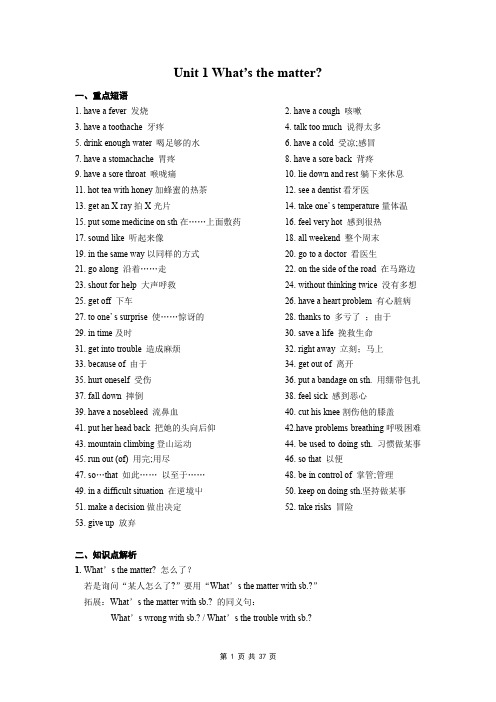
Unit 1 What’s the matter?一、重点短语1. have a fever 发烧2. have a cough 咳嗽3. have a toothache 牙疼4. talk too much 说得太多5. drink enough water 喝足够的水6. have a cold 受凉;感冒7. have a stomachache 胃疼8. have a sore back 背疼9. have a sore throat 喉咙痛10. lie down and rest躺下来休息11. hot tea with honey加蜂蜜的热茶12. see a dentist看牙医13. get an X-ray拍X光片14. take one’ s temperature量体温15. put some medicine on sth在……上面敷药16. feel very hot 感到很热17. sound like 听起来像18. all weekend 整个周末19. in the same way以同样的方式20. go to a doctor 看医生21. go along 沿着……走22. on the side of the road 在马路边23. shout for help 大声呼救24. without thinking twice 没有多想25. get off 下车26. have a heart problem 有心脏病27. to one’ s surprise 使……惊讶的28. thanks to 多亏了;由于29. in time及时30. save a life 挽救生命31. get into trouble 造成麻烦32. right away 立刻;马上33. because of 由于34. get out of 离开35. hurt oneself 受伤36. put a bandage on sth. 用绷带包扎37. fall down 摔倒38. feel sick 感到恶心39. have a nosebleed 流鼻血40. cut his knee割伤他的膝盖41. put her head back 把她的头向后仰42.have problems breathing呼吸困难43. mountain climbing登山运动44. be used to doing sth. 习惯做某事45. run out (of) 用完;用尽46. so that 以便47. so…that 如此……以至于……48. be in control of 掌管;管理49. in a difficult situation 在逆境屮50. keep on doing sth.坚持做某事51. make a decision做出决定52. take risks 冒险53. give up 放弃二、知识点解析1. What’s the matter? 怎么了?若是询问“某人怎么了?”要用“What’s the matter with sb.?”拓展:What’s the matter with sb.? 的同义句:What’s wrong with sb.? / What’s the trouble with sb.?2.疾病类短语:have a +疾病. e.g. :have a fever 发烧have a cold 感冒have a cough 咳嗽.have a +身体部位-ache. e.g.: have a headache 头痛have a toothache 牙痛.have a sore+身体部位. e.g.: have a sore throat咽喉痛have a sore back背痛例题:Mom, I____________.I’m sorry to hear that, dear. We must go to see the dentist right away.A. have a headacheB. have a stomachacheC. have a toothacheD. have a fever3. lie down 躺下V. 躺,平躺。

八年级下册英语一到三单元知识点那咱开始!一单元知识点。
1. 一般将来时。
- 这可是个重要的时态哦!表示将来要发生的动作或存在的状态。
常见的结构有“will + 动词原形”和“be going to + 动词原形”。
比如说,“I will go to Beijing next week.”(我下周要去北京。
)“He is going to have a party tomorrow.”(他明天要开个派对。
)- 要注意哦,will 比较随意,be going to 通常是有计划、有打算的。
2. 短语大集合。
- fall down (摔倒)想象一下,像个大冬瓜“扑通”一下倒地上。
- look for (寻找)别和 find 搞混啦,find 是“找到”,look for 是还在努力找的过程。
- in the future (在未来)未来嘛,充满了神秘和可能!二单元知识点。
1. 情态动词 could。
- could 这个小家伙,语气比 can 更委婉、更客气。
“Could you please help me?”(你能帮帮我吗?)比“Can you please help me?”听起来更有礼貌。
- 还有,could 还能是 can 的过去式,表示过去的能力。
2. 动词短语。
- cheer up (使高兴;使振奋)就像给心情打了一针兴奋剂!- give out (分发;散发)把东西一个一个发出去。
- come up with (想出;提出)脑袋里突然蹦出个好主意。
3. 感叹句。
- What + (a/an) + 形容词 + 名词 + (主语 + 谓语)!“What a beautiful flower!”(多美的花啊!)- How + 形容词/副词 + (主语 + 谓语)!像“How fast he runs!”(他跑得多快啊!)1. 过去进行时。
- 这是在讲过去某个时刻正在进行的动作。
结构是“was/were + 动词的现在分词”。
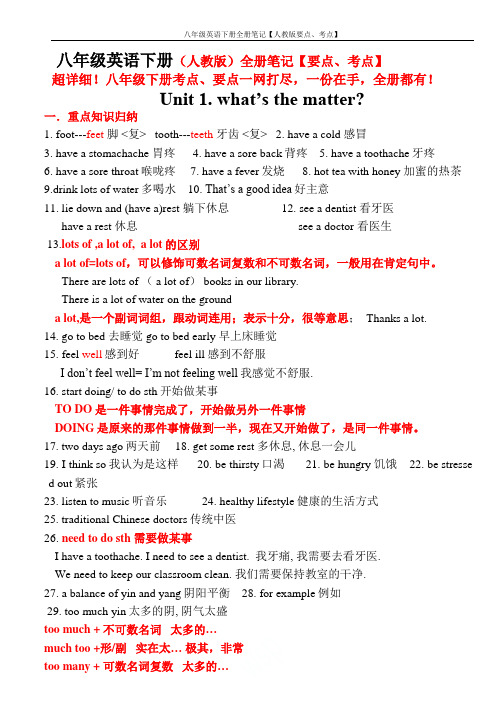
八年级英语下册(人教版)全册笔记【要点、考点】超详细!八年级下册考点、要点一网打尽,一份在手,全册都有!Unit 1. what’s the matter?一.重点知识归纳1. foot---feet脚 <复> tooth---teeth 牙齿 <复>2. have a cold 感冒3. have a stomachache 胃疼4. have a sore back背疼5. have a toothache牙疼6. have a sore throat喉咙疼7. have a fever发烧8. hot tea with honey 加蜜的热茶9.drink lots of water多喝水 10. That’s a good idea好主意11. lie down and (have a)rest 躺下休息 12. see a dentist 看牙医have a rest 休息 see a doctor 看医生13.lots of ,a lot of, a lot的区别a lot of=lots of,可以修饰可数名词复数和不可数名词,一般用在肯定句中。
There are lots of ( a lot of) books in our library.There is a lot of water on the grounda lot,是一个副词词组,跟动词连用;表示十分,很等意思; Thanks a lot.14. go to bed 去睡觉 go to bed early 早上床睡觉15. feel well感到好 feel ill 感到不舒服I don’t feel well= I’m not feeling well我感觉不舒服.16. start doing/ to do sth开始做某事TO DO 是一件事情完成了,开始做另外一件事情DOING是原来的那件事情做到一半,现在又开始做了,是同一件事情。

人教版英语八年级下册知识点总结一、语法知识点1. 时态:掌握一般现在时、一般过去时、一般将来时、现在进行时、过去进行时、过去将来时等时态的用法。
2. 过去进行时:用于表示过去某一时间正在进行的动作或状态。
3. 以下代词和副词的用法:- somebody, anybody, nobody, everybody 可用作主语或宾语。
- something, anything, nothing, everything 可用作主语或宾语。
- somewhere, anywhere, nowhere, everywhere 可用作地点副词。
4. 句型:掌握各种基本句型,如祈使句、选择疑问句、反义疑问句等。
5. 状语从句:掌握时间、原因、结果、条件等类型的状语从句的用法,并注意从句的引导词。
6. 定语从句:研究使用关系代词 who, whom, whose, which, that 引导定语从句,并了解先行词和关系词在从句中的作用关系。
二、词汇知识点1. 词汇拼写和用法:巩固和扩大基础词汇量,掌握词汇的正确拼写和用法。
2. 同义词和反义词:研究常用的同义词和反义词,提高词汇表达的能力。
3. 词组和固定搭配:掌握常用的词组和固定搭配,能够灵活运用。
三、阅读知识点1. 阅读理解:提高阅读理解能力,掌握快速获取信息的技巧。
2. 阅读策略:研究使用各种阅读策略,如扫读、略读、详读、推断等。
3. 阅读技巧:培养良好的阅读惯和技巧,如划重点、标记陌生单词等。
四、写作知识点1. 写作结构和组织:研究写作时合理安排文章结构和组织思路,使内容连贯。
2. 信息衔接和过渡:掌握信息衔接和过渡的方法,使文章各部分之间有逻辑性。
3. 词汇和句型运用:运用丰富的词汇和多样的句型,提高写作表达的准确性和流畅性。
以上为人教版英语八年级下册的主要知识点总结,希望能帮到你!。

八年级下册英语笔记重点归纳一、Unit 1 What's the matter?1. 重点单词。
- matter n.问题;事情。
常用搭配:What's the matter (with sb.)?(某人)怎么了?- have a cold 感冒。
类似的表达还有:have a fever(发烧),have a cough (咳嗽)等。
- stomachache n.胃痛;腹痛。
“-ache”为后缀,表示疼痛,如:headache (头痛),toothache(牙痛)。
- foot n.脚,复数形式为feet。
- lie v.躺;平躺。
lie - lay - lain。
例如:You should lie down and rest.(你应该躺下休息。
)- rest v. n.放松;休息。
如:take a rest(休息一下)。
2. 重点短语。
- take one's temperature 量体温。
例如:The nurse took my temperature.(护士给我量了体温。
)- take breaks (take a break) 休息。
We should take breaks when we are tired.(当我们累的时候应该休息。
)- get off 下车。
He got off the bus at the next stop.(他在下一站下了公共汽车。
)- to one's surprise 使……惊讶的是;出乎……的意料。
To my surprise, he passed the exam.(令我惊讶的是,他通过了考试。
)- What should I do? 我应该做什么?用于询问建议。
- You should see a dentist and get an X - ray. 你应该去看牙医并且拍个X 光片。
should为情态动词,后接动词原形,表示建议。

人教版八年级下册英语——知识点语法归纳总结Unit 1 What’s the matter?1. 短语归纳①have a cold/ fever/ stomachache…感冒、发烧、胃疼……②lie down 躺下③too much 太多④get an X-ray 拍片⑤take one’s temperature量体温⑥sound like 听起来像……⑦take breaks (take a break) 休息⑧go to a doctor 看医生⑨get off 下车⑩on the side of…在……边上have a heart problem 患心脏病wait for 等待to one’s surprise 使……惊讶的;出乎意料? thanks to 多亏;由于in time 及时think about 考虑,认为right away 立刻,马上get into trouble 陷入麻烦fall down 摔倒a few 几个,一些21 have problems breathing 呼吸困难22 get sunburned 晒伤23 look up 查阅24 be interested in…对……感兴趣25 be used to doing…习惯于做某事26 take risks (take a risk) 冒险27 lose one’s life 丧生28 became of 因为29 run out (of) 用尽,耗尽30 be ready to do sth. 准备做某事31 cut off 切除32 climb down 爬下33 get out of 离开;从……出来34 tell of 讲述35 the importance of (doing sth.) (做某事的)重要性36 be in control of 掌管,管理37 make a decision 做决定38 keep on doing sth. 坚持做某事39 give up 放弃40 cut/ hurt oneself 使自己受伤2. 典句必背①What’s the matter?②I have a stomachache.③What should I do?④Should I take my temperature?⑤I think you should lie down and rest.⑥If your head and neck still hurt tomorrow, then go to a doctor.⑦His love for mountain climbing is so great that he kept on climbing mountains even after this experience.3. 用法集萃(1) 当别人心情不好,身体不适或遇到麻烦时,我们可以用如下表达表示关心:What’s the matter?What’s the matter with you?What’s wrong with …?What’s the trouble\problem with …?(2) 英语中常用have描述身体的不适,此时have意为“患有”,常用结构:①have a + 疾病例:have a cold 感冒;have a fever 发烧;have a cough 咳嗽②have a + 身体部位-ache例:have a headache 头痛;have a toothache 牙痛③have a sore + 身体部位例:have a sore throat 咽喉痛;have a sore back 背痛(3) lie down躺下;tell lies/a lie 说谎含义过去式过去分词躺;平躺lay lain位于撒谎;说谎lied lied(4) maybe & may be①maybe,“或许”,常用于句首,表示可能性,后加句子。
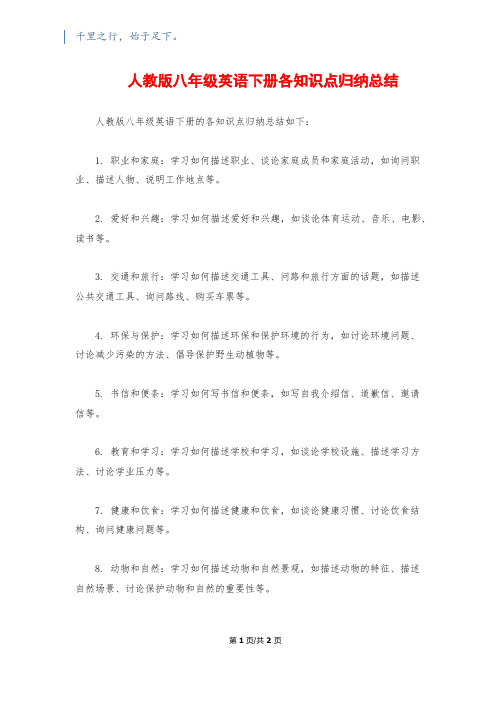
千里之行,始于足下。
人教版八年级英语下册各知识点归纳总结
人教版八年级英语下册的各知识点归纳总结如下:
1. 职业和家庭:学习如何描述职业、谈论家庭成员和家庭活动,如询问职业、描述人物、说明工作地点等。
2. 爱好和兴趣:学习如何描述爱好和兴趣,如谈论体育运动、音乐、电影、读书等。
3. 交通和旅行:学习如何描述交通工具、问路和旅行方面的话题,如描述公共交通工具、询问路线、购买车票等。
4. 环保与保护:学习如何描述环保和保护环境的行为,如讨论环境问题、讨论减少污染的方法、倡导保护野生动植物等。
5. 书信和便条:学习如何写书信和便条,如写自我介绍信、道歉信、邀请信等。
6. 教育和学习:学习如何描述学校和学习,如谈论学校设施、描述学习方法、讨论学业压力等。
7. 健康和饮食:学习如何描述健康和饮食,如谈论健康习惯、讨论饮食结构、询问健康问题等。
8. 动物和自然:学习如何描述动物和自然景观,如描述动物的特征、描述自然场景、讨论保护动物和自然的重要性等。
第1页/共2页
锲而不舍,金石可镂。
9. 文化和传统:学习如何描述文化和传统活动,如讨论节日、描述传统习俗、谈论文化差异等。
10. 社会问题和解决方案:学习如何描述社会问题和提出解决方案,如谈论青少年问题、讨论解决社会问题的方法等。
以上是人教版八年级英语下册的各知识点的归纳总结,供您参考。
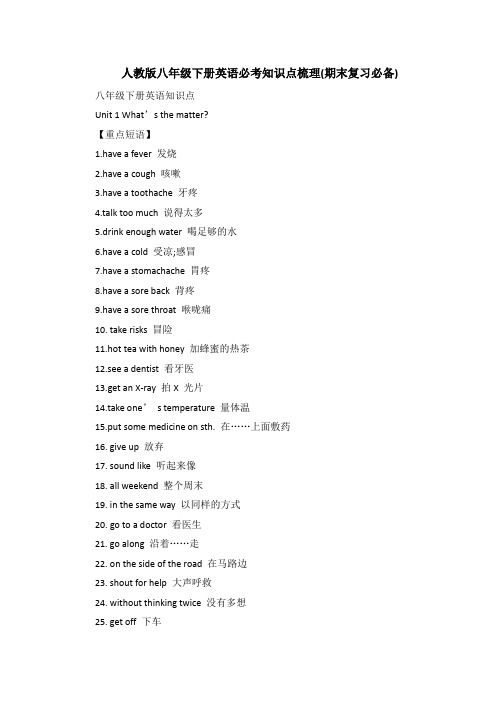
人教版八年级下册英语必考知识点梳理(期末复习必备)八年级下册英语知识点Unit 1 What’s the matter?【重点短语】1.have a fever 发烧2.have a cough 咳嗽3.have a toothache 牙疼4.talk too much 说得太多5.drink enough water 喝足够的水6.have a cold 受凉;感冒7.have a stomachache 胃疼8.have a sore back 背疼9.have a sore throat 喉咙痛10. take risks 冒险11.hot tea with honey 加蜂蜜的热茶12.see a dentist 看牙医13.get an X-ray 拍X 光片14.take one’s temperature 量体温15.put some medicine on sth. 在……上面敷药16. give up 放弃17. sound like 听起来像18. all weekend 整个周末19. in the same way 以同样的方式20. go to a doctor 看医生21. go along 沿着……走22. on the side of the road 在马路边23. shout for help 大声呼救24. without thinking twice 没有多想25. get off 下车26. have a heart problem 有心脏病27. to one’s surprise 另某人惊讶的是28. thanks to 多亏了;由于29. in time 及时30. make a decision 做出决定31. get into trouble 造成麻烦32. right away 立刻;马上33. because of 由于34. get out of 离开;从……出来35. keep on doing sth. 继续或坚持做某事36. put a bandage on sth. 用绷带包扎37. fall down 摔倒38. feel sick 感到恶心39. have a nosebleed 流鼻血40. cut his knee 割伤他的膝盖41. put her head back 把她的头向后仰42. have problems breathing 呼吸困难43. mountain climbing 登山运动44. be used to doing sth. 习惯做某事45. run out (of) 用完;用尽46. so that 以便47. so...that... 如此……以至于...…48. be in control of 掌管;管理49. in a difficult situation 在闲境中【重点句型】1. What's the matter with you?= What'the trouble with you? = What's wrong with you? 你怎么了?2. What should she do? 她该怎么办呢?3.Should I take my temperature? 我应该量一下体温吗?4.You should lie down and rest. 你应该躺下休息一会儿。
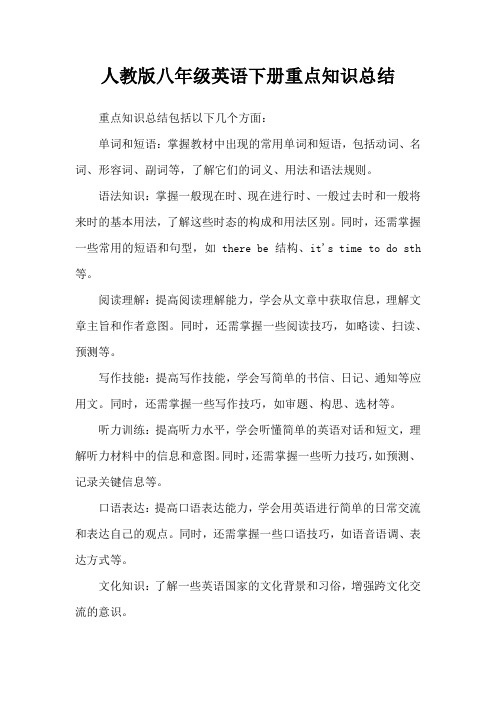
人教版八年级英语下册重点知识总结
重点知识总结包括以下几个方面:
单词和短语:掌握教材中出现的常用单词和短语,包括动词、名词、形容词、副词等,了解它们的词义、用法和语法规则。
语法知识:掌握一般现在时、现在进行时、一般过去时和一般将来时的基本用法,了解这些时态的构成和用法区别。
同时,还需掌握一些常用的短语和句型,如there be结构、it's time to do sth 等。
阅读理解:提高阅读理解能力,学会从文章中获取信息,理解文章主旨和作者意图。
同时,还需掌握一些阅读技巧,如略读、扫读、预测等。
写作技能:提高写作技能,学会写简单的书信、日记、通知等应用文。
同时,还需掌握一些写作技巧,如审题、构思、选材等。
听力训练:提高听力水平,学会听懂简单的英语对话和短文,理解听力材料中的信息和意图。
同时,还需掌握一些听力技巧,如预测、记录关键信息等。
口语表达:提高口语表达能力,学会用英语进行简单的日常交流和表达自己的观点。
同时,还需掌握一些口语技巧,如语音语调、表达方式等。
文化知识:了解一些英语国家的文化背景和习俗,增强跨文化交流的意识。

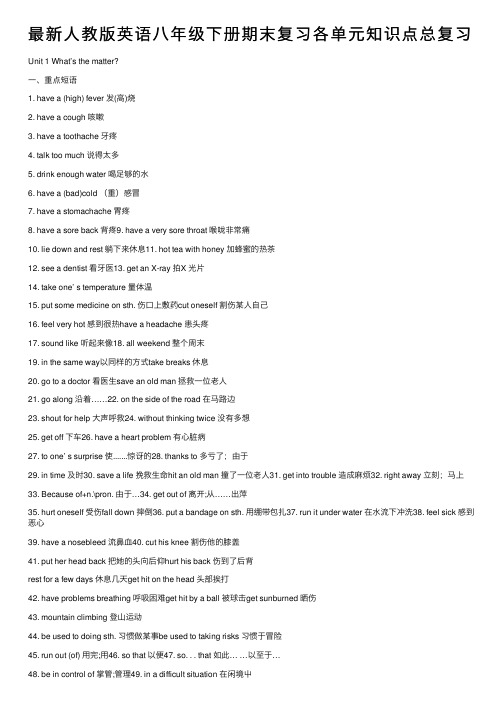
最新⼈教版英语⼋年级下册期末复习各单元知识点总复习Unit 1 What’s the matter?⼀、重点短语1. have a (high) fever 发(⾼)烧2. have a cough 咳嗽3. have a toothache ⽛疼4. talk too much 说得太多5. drink enough water 喝⾜够的⽔6. have a (bad)cold (重)感冒7. have a stomachache 胃疼8. have a sore back 背疼9. have a very sore throat 喉咙⾮常痛10. lie down and rest 躺下来休息11. hot tea with honey 加蜂蜜的热茶12. see a dentist 看⽛医13. get an X-ray 拍X 光⽚14. take one’ s temperature 量体温15. put some medicine on sth. 伤⼝上敷药cut oneself 割伤某⼈⾃⼰16. feel very hot 感到很热have a headache 患头疼17. sound like 听起来像18. all weekend 整个周末19. in the same way以同样的⽅式take breaks 休息20. go to a doctor 看医⽣save an old man 拯救⼀位⽼⼈21. go along 沿着……22. on the side of the road 在马路边23. shout for help ⼤声呼救24. without thinking twice 没有多想25. get off 下车26. have a heart problem 有⼼脏病27. to one’ s surprise 使.......惊讶的28. thanks to 多亏了;由于29. in time 及时30. save a life 挽救⽣命hit an old man 撞了⼀位⽼⼈31. get into trouble 造成⿇烦32. right away ⽴刻;马上33. Because of+n.\pron. 由于…34. get out of 离开;从……出萍35. hurt oneself 受伤fall down 摔倒36. put a bandage on sth. ⽤绷带包扎37. run it under water 在⽔流下冲洗38. feel sick 感到恶⼼39. have a nosebleed 流⿐⾎40. cut his knee 割伤他的膝盖41. put her head back 把她的头向后仰hurt his back 伤到了后背rest for a few days 休息⼏天get hit on the head 头部挨打42. have problems breathing 呼吸困难get hit by a ball 被球击get sunburned 晒伤43. mountain climbing 登⼭运动44. be used to doing sth. 习惯做某事be used to taking risks 习惯于冒险45. run out (of) ⽤完;⽤46. so that 以便47. so. . . that 如此… …以⾄于…48. be in control of 掌管;管理49. in a difficult situation 在闲境⼬lose one’s life 丧命cut off half his right arm 切除半边右臂bandage himself 给他⾃⼰包扎50. keep on doing sth. 继续或坚持做某事51. make a decision 做出决定the importance of making decision做决定的重要性52. take risks 冒险go mountain climbing 去爬⼭53. give up 放弃have a serious accident 遇到严重的意外54. talk about health problems谈论健康问题55. give advice 提建议⼆、重点句型1. What’ s the matter?What’ s the matter(with you)?= What’s the trouble (with you)?= What’ s wrong with you?你怎么了?I have a stomachache. 我肚⼦疼。
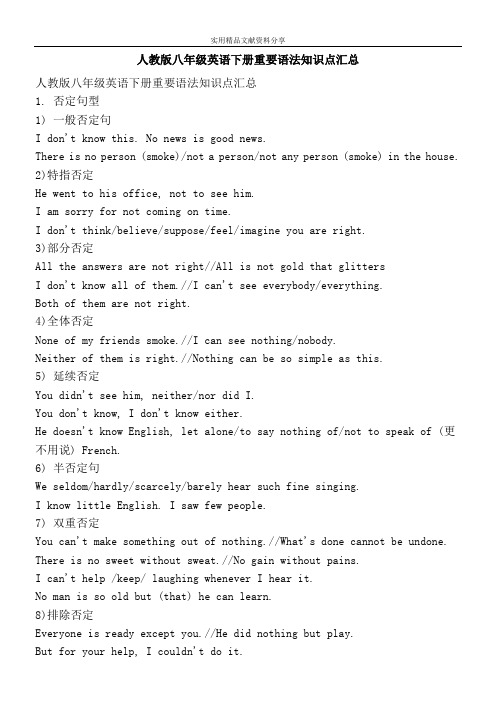
人教版八年级英语下册重要语法知识点汇总人教版八年级英语下册重要语法知识点汇总1. 否定句型1) 一般否定句I don't know this. No news is good news.There is no person (smoke)/not a person/not any person (smoke) in the house.2)特指否定He went to his office, not to see him.I am sorry for not coming on time.I don't think/believe/suppose/feel/imagine you are right.3)部分否定All the answers are not right//All is not gold that glittersI don't know all of them.//I can't see everybody/everything.Both of them are not right.4)全体否定None of my friends smoke.//I can see nothing/nobody.Neither of them is right.//Nothing can be so simple as this.5) 延续否定You didn't see him, neither/nor did I.You don't know, I don't know either.He doesn't know English, let alone/to say nothing of/not to speak of (更不用说) French.6) 半否定句We seldom/hardly/scarcely/barely hear such fine singing.I know little English. I saw few people.7) 双重否定You can't make something out of nothing.//What's done cannot be undone. There is no sweet without sweat.//No gain without pains.I can't help /keep/ laughing whenever I hear it.No man is so old but (that) he can learn.8)排除否定Everyone is ready except you.//He did nothing but play.But for your help, I couldn't do it.9)加强否定I won't do it at all.//I can't see it any more.//He is no longer a boy.2. 判断句型1) 一般判断句It is important for us to learn English.It is kind of you to help me sincere means honest.The boy is called/named Tom.We regarded/consider it as an honor.2)强调判断It is English that we should learn.//It is he who helped me a lot.3)弱式判断Your sentence doesn't sound/look/appear/feel right.You look/seem as if/as thought you had been there before.Maybe/Perhaps/ she is ill.He is probably ill.//He is likely ill. //It is possible that he is late 4) 注释判断He can remember so many English words, that is (to say) he is a living dictionary.(活字典)5) 正反判断That sounds all right, but in fact it is not.6) 比较判断It is more a picture than a poem.7) 互斥判断He or you are wrong. Either he is right or I am.3. 祝愿祁使句式1) 一般句式Study hard and keep fit. Be brave! Don't be shy! Get out of here.2)强语式Do tell me. Never tell a lie.3) 委婉祈使句Please tell me the true. Would/Will/Won't do me a favor?Would/Do you mind my smoking? What/How/ about going on foot?4)建议祈使句Let us go. Let us know the time. Don't let the fire out.Let's not waste the time. You'd better start early.Shall we listen to some music? Why don't you get something to drink? Suppose/supposing you pick me up at about six?I suggest we (should) take the train.5)祝愿句Success to you! //Wish you a good journey.May you have a happy marriage. //Here's to your success!Allow me to propose a toast to our friendship!4. 感叹句型How well he speaks! //How kind she is! //What a nice weather it is! Here he comes! //Such is life! //Wonderful! // Help!5. 疑问句型1) 一般疑问句Is he a doctor?//Do you the way to the station?2)反意疑问句He is a teacher, isn't he?//It is quite cheap, don't you think?3) 特殊疑问句What is the distance/width/size/population/temperature/fare?Who is he? What is he?(干什么的)//What is he like? // How is he? How do you like him? //What do you think of him?What ever do you mean by saying this?4)选择疑问句He is a doctor or a nurse?5)间接疑问句Do you know how old he is? //Tell me if (whether) you like it.What do you think/say/suppose I should do?6. 数词句型1) 表数目It is exactly ten o'clock.//It is five miles away from here.He is more than/over/ at least not less than 20.He is under/at most/no more than 20.2)表年月日He was born on April 22 1994/in 1994 on the morning of Oct.1.3)表年龄He is 20 years old/years of age.//He is at the age of 10.4)表倍数It is four times that of last years.This is four times as big (again) as that one.This is four times bigger than that one.The income is double what it was.The output of coal was 200% greater than in 1998.5)表计量It is 10 meters long/wide/high.//It costs me 100 yuan.I spent 10 hours to finish it.//It took me 10 days to finish it.It is worth 100 yuan.7. 关联指代句型1)两项关连I have two books, one is Chinese; the other English.I have five books, one is Chinese; the others English.To say is one thing, but/and/ to do is another.One the one hand, I am your teacher, and on the other hand, I am also you friend.Some like to play football, others are fond of basketball.2)先后顺序First/firstly, I wish good health, second/secondly success in your study, third/thirdly good luck in everything.First stop, then look, finally cross.At first/in the beginning/ he word hard. Later/Afterwards he is not so diligent.3)修饰限制This is the same book as I lost yesterday.This is the same book that I lost yesterday.(同一本书)Don't trust such a man as over praise you.He/One/Those/They who should come failed to appear.A man/A person/The one/Anyone/People who saw her liked her very much.The day/time/moment will come when China is strongest in the world.4) 两项连接He can speak not only English but also French.The book is both interesting and instructive.It is neither cold nor hot.Please either come in or go out.The old worker has experience and knowledge as well.5)加和关系Besides literature, we have grammar and writing.Apart from oxygen, there are some other gases in the air.In addition to "if", there is many other conjunctions that can introduce conditional clauses.I must go now, incidentally, if you want that book.You seem to like tea, so do I.8. 比较句型1)等比句He is as tall as I. // He is the same height as I.She is no less diligent than he. The lab is no better than a cottage.2) 差比句I speak English worse than he does.//He is not so/as tall as I am.Our knowledge is much inferior to their.3) 极比句He is the tallest of all in the class.None/No one/ is so blind as those that won't see.Nothing is so easy as this.4)比例句The more a man knows, the more he feels his ignorance(无知).5) 择比句He is taller than any other boy in the classIt is better late than never.//They would die than live as slavesHe prefers doing to talking//He prefers to do rather than to talk.He prefers mathematics to English.//I'd rather stay here.6)对比句You think me idle, but on the contrary, I am busy.They are working hard while you are wasting your time.9. 比喻句型We must work like him.//He behaves as his father does.He speaks English as if/though he was a foreigner.10. 条件假设句1) 一般事实If we succeed, what will the people say?Suppose it rains, what shall we do?Persevere(坚持) and you'll succeed.2)虚拟条件句If I were you, I would go.//If you had seen it, you would have been moved.3)反条件句Unless you try, you'll never succeed.//Don't move, or/else/otherwise I'll shot.4)唯一条件句If only I have another chance, I shall do better.Only in this way can we learn English well.So/As long as we don't lose heart, we'll succeed.5)推论条件句Since that is so, there is no more to say.Now that you are grown up, you must stop this behavior.11. 时间句型1)一般时When I see him, I'll tell him.2) 表同时You'll grow wiser as you grow older.Work while you work, play while you play.He worked, at the same/in the meantime he listened to the music.3)限制时Every/each time when I went to his house, he was out.By the time that we got there, he was out.4)交替时Sometimes he sings, sometimes he dances.At one time the baby cries, at another it talks.5)先时I stopped hem before he began to talk with me.6)后时I'll tell you after I finish it.7)紧接时As soon as I see him, I'll tell him.Once you begin, you must continue.The (very) moment/instant (that) I saw him, I recognized him. On hearing the news, she bust into tears.Hardly had I seen the light, when I heard a loud thundering.8)延续时I haven't seen him since I came here.A friend is never know till/until a man have need.12. 地点句型1) 一般地点Where have you been?Where there is a will, there is a way.2)方位Hebei lies in the east of China.Japan is lies to the east of China.The house faces (to) the south.He is sitting at the front of the classroomHe is standing in front of/before me.He is sitting at the back of/behind me.He is sitting in the back of/at the rear of the classroom. He is sitting next to/besides me.He is sitting close to/near me.At the top of/On top of the shelf, there are some books.He is sitting on the left/right.The mountain you see to the right is the Purple Mountain. 13. 原因句型He didn't go to school because he was ill.Since we are all here, let's begin our meeting.It might rain yesterday, for the ground was wet.Now (that) we have finished the work, we can go home.I am glad to meet you.I am sorry that I hear that.Thank you for your help.That is why he failed to come.He didn't come because of/on account of the weather.He went out of curiosity.I succeeded thanks to his help.This failure is due to the fact they lack experience.Owing to our joint efforts, the task was fulfilled.What are studying English for?For what reason did you choose this?What's the point of asking his to do that?How come you never told me about it?What with the wind and what with the rain, our walk was spoiled.14. 目的句型He stopped aside so that she could go in.He sits in the front in order that he can see words clearly.He gets up early so as to/in order to have time to do exercises. He repeated it for fear that there should be any mistake.15. 结果句型It was very cold, so that the river froze.They cost a lot of money, so/therefore we use them carefully. He is such a good man that every one likes him.He ran so fast that no one could catch him.He hurried to the house only to find that it was empty.I was caught in the rain. As a result, I had a bad cold.16. 程度句型How often do you write to your parents?How long do you stay at home?It is so beautiful that we all love it.It is too big for you.He is too excited to speak.He is not old enough to know this.The letter must be sent as soon as possibleYou must work as hard as you can.As far as I know, I can speak only English.17. 让步句型Though/Although he is rich, (yet/still) he doesn't show off.Yang as he is, he know a lot of things.Even if/though he succeeded, he was not proud.No matter what you say, I'll still try to do it.Keep calm, whatever happens.In spite of this, we must go ahead with our plans.Regardless of all the difficulties, we'll fight it out to the end.18. 转折句型I searched everywhere but could not find him.You may go, only return quickly.He is seriously ill, still there is hope of his recovery.It looked like rain, however it was clear in the afternoon.He is still young, yet he is high up in the position.He didn't tell me the truth, I know it, though.19. 省略句I think/say/suppose/expect/believe/hope so.Why not come earlier next time?。

Unit1What’sthematter?一、短语归纳1.haveacold感冒2.haveastomachache胃痛3.haveafever发烧4.haveacough咳嗽5.haveatoothache牙痛6.haveaheadache头痛7.haveasoreback背痛=haveabackache8.haveasorethroat喉咙痛9.talktoomuch说得太多10.seeadentist看牙医11.gotoadoctor看医生12.getanX-ray拍X光13.liedown躺下14.liedownandrest躺下休息15.havearest休息16.takeabreak休息=takebreaks17.takeyourtemperature量你的体温18.hurtherself伤到她自己19.cutmyself切到我自己20.cutoff切除cutdown砍到cutup切断cutout删除21.getoff下车22.makeadecision做决定23.tomysurprise令我惊讶的是24.ontheweekend在周末=onweekends25.inthesameway以相同的方式26.withoutthinkingtwice毫不犹豫27.thanksto多亏thanksfor因⋯而感谢(+名词/动词ing)28.intime及时ontime按时29.savealife挽救生命30.getintotrouble陷入麻烦31.rightaway马上32.falldown跌倒33.waitfor等待34.beinterestedindoingsth.对做某事感兴趣35.giveup放弃二、用法集萃1.询问有什么病或有什么麻烦:What’sthematter(withsb.)?2.疾病的表达:have/hasa+疾病名称3.太多:toomuch+不可数名词;toomany+可数名词复数形式太:muchtoo+形容词4. enough足够的:①形容词+enough②enough+名词③itisenough+todosth.5. lie躺下过去式:lay现在分词:lying6.seesb.doingsth.看见某人正在做某事(正在进行)seesb.dosth.看见某人做了某事(看见动作的全过程)7.expecttodosth.期望做某事8.needtodosth.需要做某事9.helpsb.(to)dosth.帮助某人做某事10.tellsb.(not)todosth.告诉某人(不要)做某事11.asksb.todosth.要求某人做某事12.wanttodosth.想要做某事13.agreetodosth同.意做某事disagreetodosth.不同意做某事agreewithsb.同意某人的意见14.trouble问题;麻烦havetrouble/problemdoingsth.做某事有困难15.介词+doing常见的介词有:at;for;with;without;inabout16.be/getusedtodoingsth.习惯于做某事17.keepondoingsth.继续做某事18.minddoingtsh.介意做某事19.反身代词:myself我自己yourself你自己himself他自己herself她自己itself它自己复数:ourselves我们自己yourselves你们自己themselves他们自己20.knife-knives刀名词复数规则变化:①一般情况+s②以e结尾+s③以s、x、ch、sh结尾+es④以辅音字母+y结尾,变y为i+es⑤以o结尾,有生命+es;无生命+s⑥以f/fe结尾,变f/fe为v+es不规则变化:foot-feet脚、足tooth-teeth牙齿man-men男人woman-women女人mouse-mice老鼠21.important重要的importance重要性different不同的difference差异性22.death死亡(名词)die死(动词)dead死的(形容词)三、书面表达Howtokeephealthy如何保持健康Healthisimportant.Everyonewantstobehealthy.Letmetellyouhowtokeephealthy.Firstofall,weshouldeathealthyfood.Weshouldeatmorevegetablesandfruit.Wealson eedtodrinkmilk.Secondly,weshouldexercisealot.Weshoulddosomesportsafterschool.Finally,weshouldhaveenoughsleep.Tohaveagoodrest,weshouldgotobedearlyandgetupearly.Ithinkitisimportantforustokeephealthy.3Unit2I’llhelptocleanupthecityparks.一、短语归纳1. cleanup打扫干净cheerup使兴起来代词放中间2.giveout分发3.handout分发eupwith想出;提出(idea、plan等)5. putoff推迟puton穿衣服putup张贴putaway把⋯收好6.callup打电话;征召edtodosth.曾经做某事beusedtodingsth习.惯于做某事8. lonely孤独的(常用于feel之后)alone独自一人9.carefor照顾=takecareof10.afeelingofsatisfaction一种满足感11.tryout参加⋯选拔12.raisemoney募捐13.fixup修理14.giveaway赠送(money、oldclothes/books等)giveup放弃15.takeafter(外貌或行为)像16.besimilarto与⋯相似17.setup建立18.makeadifference影响;有作用19.disabledpeople残疾人20.makeaplan制定计划21.oldpeople’shome养老院22.helpoutwithsth.帮助解决困难23.abooklover书迷24.attheageof在⋯岁时etrue实现(与dream连用)26.atthesametime同时27.homelesspeople无家可归的人28.beworriedabout为⋯而担心worryabout担心29.forexample例如30.runoutof用完31.not⋯anymore不再32.atonce立刻;马上=rightaway二、用法集萃1.volunteertodosth自愿做某事2. difficult困难的difficulty困难havedifficulty(in)doingsth.做某事有困难3.excited兴奋的(人作主语)exciting使人兴奋的(物作主语)口诀:人+ed物+ing4.疑问词(how,what,where)+todo5. decidetodosth.决定做某事名词形式:decision makeadecision做决定6.learntodosth.学习做某事7.agoodwaytodosth.做某事的好方法8.wouldliketodosth.=wanttodosth.想要做某事9.thankyouforsth./doingsth.因某事/做某事而感谢10.kind善良的kindness善意Unit3Couldyoupleasecleanyourroom?一、短语归纳1.dothedishes清洗餐具2.takeouttherubbish倒垃圾3.foldtheclothes叠衣服foldmy/your/hisclothes4.sweepthefloor扫地5.makethebed铺床makemy/your/hisbed6.cleanthelivingroom打扫客厅7.helpoutwithsth.帮助解决某事8.atleast至少eover过来;顺便来访10.infrontof在⋯前面11.takethedogforawalk遛狗12.allthetime一直13.assoonas一⋯就⋯14.insurprise惊讶地15.hangout闲逛16.dochores做家务17.awasteoftime浪费时间18.inorderto为了19.getgoodgrades取得好成绩20.dependon依靠21.takecareof=carefor=lookafter照顾22.asaresult结果23.fallill生病二、用法集萃1.finishdoingsth.完成做某事2.if如果(主将从现,if后为从句,用一般现在时);是否(位于动词之后)3.assoonas一⋯就⋯.主将从现,assoonas后为从句4.replyangrily生气地回答(副词修饰动词,一般位于动词之后)abeautifuldog一只漂亮的狗(形容词修饰,名词,位于名词前)口诀:形名动副5.beangrywithsb.生某人的气6.as+形容词原级+as和⋯一样7.neitherdidI我也没有neither+be动词/助动词(do/does/did)/情态动词+主语“主语也不⋯..”so+be动词/助动词(do/does/did)/情态动词+主语“主语也⋯”8.can-could可以can,could还可以表示请求,could比can更有礼貌肯定回答:Sure./Ofcourse./Noproblem./Yes,sure.否定回答:No,youcan’t./Sorry,Ican’t.9.asksb.todosth.要求某人做某事10.borrow⋯from⋯跟⋯借(借进来)lend⋯to⋯把⋯借给⋯.(借出去)11.invitesb.todosth.邀请某人做某事12.helpwithsth.helpsb.(to)dotsh.帮助做某事13.havetimetodosth.有时间做某事havenotimetodosth没.时间做某事14.letsb.dosth.让某人做某事15.makesb.dosth.让某人做某事16.spend花费人+spend+时间+onsth/doingsth在某事上花时间/花时间做某事cost花费物+cost+金钱$某物花了多少钱take(took)花费Ittakes/tooksb.+时间+todo.做某事花了某人多少时间payfor付费17.itis+adj(forsb.)+todosth.做某事对某人而言是⋯的18.fair公平的unfair不公平的fairness公平性19.doone’spartindoingsth.尽自己的职责做某事20.the+比较级,the+比较级越...越⋯比较级and比较级越⋯越⋯theearlier⋯thebetter越早越好betterandbetter越来越好Unit4Whydon’tyoutalktoyourparents?一、短语归纳1.talkto/withsb.与某人交谈talkaboutsth.谈论某事2.freetime空闲时间3.allowab.todosth.允许某人做某事allowdoingsth.允许做某事4.hangout闲逛5.getintoafight争吵;打架6.sothat为了;以便于7.lookthrough浏览;快速查看8.workout成功地发展;解决9.getonwith/getalongwith和睦相处municatewithsb.与某人交谈11.abigdeal重要的事petewithsb.与某人竞争13.examskills应试技巧14.cutout删除pare⋯with⋯比较16.not..until直到⋯才17.arguewithsb.与某人争吵18.noproblem没问题19.not..anymore不再20.inmyopinion依我看21.thanksfor因⋯而感谢22.allkindsof各种各样的23.worryabout为⋯而担心=beworriedabout二、用法集萃1.提建议句型:①Youshould/shouldn’t dosth.②How/Whataboutdoingsth.?③Whydon’tyoudosth.?④Whynotdosth.?⑤Shallwedosth.?⑥Let’sdosth.⑦You’dbetterdosth.⑧Wouldyouminddoingsth.?常见回答:Goodidea./Soundsinteresting./I’dliketo./Great.否定:I’dloveto,butIhaveto⋯/Sorry,Ican’t.2.beangrywithsb.生某人的气3. although/though虽然不与but连用4.advice建议(不可数名词)5.refusetodosth.拒绝做某事6.instead代替;反而(位于句首或句尾)insteadof代替(位于句中)7.offertohelp提供帮助8.minddoingsth.介意做某事9.continuetodo/doingath.继续做某事10.keepondoingsth.继续做某事11.afew一些(肯定)few一点点(否定)修饰可数名词复数形式alittle一些(肯定)little一点点(否定)修饰不可数名词做题步骤:先看横线后的名词,判断可数还是不可数;其次,理解句子表达的肯定还是否定12.it’s timeforsth.该做某事了=it’stimetodosth.pete竞争(动词)competition竞争(名词)14.havetimetodosth有.时间做某事Unit5Whatwereyoudoingwhentherainstormcame?一、短语归纳1.gooff闹钟发出响声2.rainheavily下大雨3.pickup接电话;采摘4.atfirst起先5.fallasleep进入梦乡6.diedown逐渐变弱7.havealook看一看8.makeone’sway费力地前进9.insilence沉默10.takedown拆除;往下拽;记录11.atthetimeof⋯当⋯.的时候12.waitfor等待13.atthattime在那时(一般过去时标志词)14.wakeup醒来15.goshopping去购物16.takeashower洗澡17.inamess乱七八糟18.forexample例如19.makesure确保二、用法集萃1.过去进行时定义:表示在过去某一时刻或某一时间段正在进行的动作。
Unit 1 What’s the matter?重点:1. 情态动词should & shouldn’t 的用法;2. have + 疾病;3. 反身代词的用法。
难点:能询问并表述身体的种种不适以及对他人身体的种种不适给予适当的建议。
知识点:What’s the matter? 怎么了?What’s the matter with you? = What’s the trouble with you? = What’s wrong with you? 你怎么了?have a cold = catch a cold 感冒have a stomachache 胃痛have a sore + 部位……痛lie down 躺下take one’s temperature 量体温have a fever 发烧have a cough 咳嗽take breaks 休息get an X-ray 拍X光片away from 远离on the side of the road 在马路边shout for help 大声呼救get off 下车to one’s surprise 出乎某人意料thanks to 多亏;由于in time 及时right away 马上,立即get into 陷入get into trouble 陷入困境have a toothache 牙痛put one’s head down 低头have a nosebleed 流鼻血put a bandage on sth. 用绷带包扎get hit on the head 砸到头(注意v. + on the + 身体部位的表达方达)be interested in 对……感兴趣There were many times when …(when 引导的定语从句)be used to doing sth. 习惯做某事take risks 冒险because of 因为in …situation 处于……境地run out 用光get out of 逃离of importance = important (of + n. = adj.)be in control of 管理make a decision 做决定give up 放弃Unit 2 I’ll help to clean up the city parks.重点&难点:1. 不定式作宾语、状语和宾补的用法;2. could表建议时的用法;3. 掌握短语:run out of, take after, fix up, give away等;4. 学会用will和would like表达意愿。
知识点:clean up 清洁Clean-Up Day 清洁日city park 城市公园cheer up 使振奋give out 分发,散发after-school study program 课外学习活动put off 推迟make a plan 制定计划come up with 想出,提出used to do 曾经care for 照顾at the age of 在……岁的时候try out 参加……选拔work for 为……工作,为……效力dream come true 实现梦想learn to do 学习做某事put up 张贴hand out 分发call up 呼吁,召集volunteer one’s time to do 志愿花时间做某事raise money 募捐run out of 用光……take after = be similar to 与……相似fix up = repair 修理give away 捐赠set up 建立disabled people 残疾人a friend of mine 亲密朋友be excited about 对……感到兴奋Unit 3 Could you please clean your room?重点:学习并掌握could表提出请求和征求许可的用法,“Could you please do sth.?”“Could I please do sth.?”难点:用所学知识在实际的生活中委婉地表达自己的请求和征求许可。
知识点:do the dishes 洗碗take out rubbish 扔垃圾fold one’s clothes叠衣服sweep the floor 扫地make one’s bed 铺床clean the living room 打扫客厅go out for dinner 出去吃饭stay out late 在外面待到很晚get a ride 搭车work on 从事finish doing sth. 完成做某事be enough for sb. 对某人来说是足够的be enough to do sth. 做某事是足够的be back from sw. 从……回去(来)be back from doing sth. 做完某事回去(来)clean and tidy 干净整洁come home from school / work 放学/下班回家throw down 扔下come over 过来take …for a walk 带……去散步shout back 大声回应in surprise 惊讶地as soon as 一……就……hang out 闲逛pass sb. sth. 递给某人某物lent sb. sth. 借给某人某物borrow 借入lent 借出try not to do 尝试不做某事get sth. wet 使某物变湿do chores 干杂活hate sth. / doing sth. / to do sth. 讨厌某物/做某事help sb. with sth. / (to) do sth. 帮助某人(做)某事a waste of time 浪费时间spend one’s time on sth. / (in) doing sth. 花费时间在某物上/做某事in order to 为了get good grade 取得好成绩get into a good university 考进好大学no need for sb. to do sth. 不需要某人做某事provide sth. for sb. = provide sb. with sth. 提供某人某物mind doing sth. 介意做某事depend on 依赖develop children’s independence 培养孩子的独立性teach sb, how to do sth. 教会某人做某事do one’s part in doing 做某人份内的事look after = take care of 照顾as a result 结果the + 比较级…,the + 比较级越……越……、Unit 4 Why don’t you talk to your parents?重点:1. 学习并掌握反问句“Why don’t you do sth.?”;2. 连词until, so that, although的运用。
难点:知识点:get enough sleep 有足够的睡眠have time to do sth. 有时间做某事allow sb. to do sth. 允许某人做某事after-school class 补习班get into 陷入a fight with sb. 和某人有争执What’s wrong? 哪儿不舒服?on the phone 在电话里头call sb. up 打电话给某人take sb. to sw. 带某人去某地look through 快速查看be angry with sb. 对某人生气forget about sth. 忘记某事a big deal 重要的事work out 解决get on with = get along with 和睦相处if / whether 引导的选择条件句hang over 悬挂be nice to sb. 对某人好refuse to do 拒绝做某事instead的用法whatever, whenever, wherever, howeveroffer to help 提供帮助proper communication 适当的沟通communicate with 和……沟通be better for sb. 对某人来说更好make sth. clear 使某事清晰be afraid of doing sth. 害怕做某事along 单独的(表面上)lonely 孤独的(内心)be busy on sth. 忙于做某事come out 删除compare sth. with sth. 拿……和……作比较turn down 调低,调小turn up 调高,调大turn on 打开turn off 关掉in one’s opinion 以某人的观点Unit 5 What were you doing when the rainstorm came?重点&难点:学习并掌握when和while引导的时间状语从句以及过去进行时的运用。
知识点:at the time of 在……的时候on the street 在大街上in the road 在马路上at the bus stop 在公交车站take a shower 洗澡take a hot shower 洗热水澡miss the bus 没赶上公交车,错过公交车go off (闹钟)发出响声pick up 接电话put …over …把……放置于……上方make dinner 做晚饭beat against sth. 拍打某物at first 首先,一开始fall asleep 入睡die down 逐渐消失break …apart 使……分离in a mess 一团糟each other 互相heavy rain 大雨car wash 洗车have a look 瞧一瞧walk by 经过make one’s way to 在某人去……的路上You’re kidding. 你开玩笑吧。
be killed 被杀害(被动语态)in silence 沉默take down 摧毁look out of the window 看向窗外be shocked to do sth. 震惊于做某事the rest of 剩余的……point sth. out 指出某物call out 喊出have meaning to 对……有意义the World Trade Center 世贸中心Unit 6 An old man tried to move the mountains.重点:1. 连词unless, as soon as, so … that 的运用;2. 学习并掌握如何描述故事。